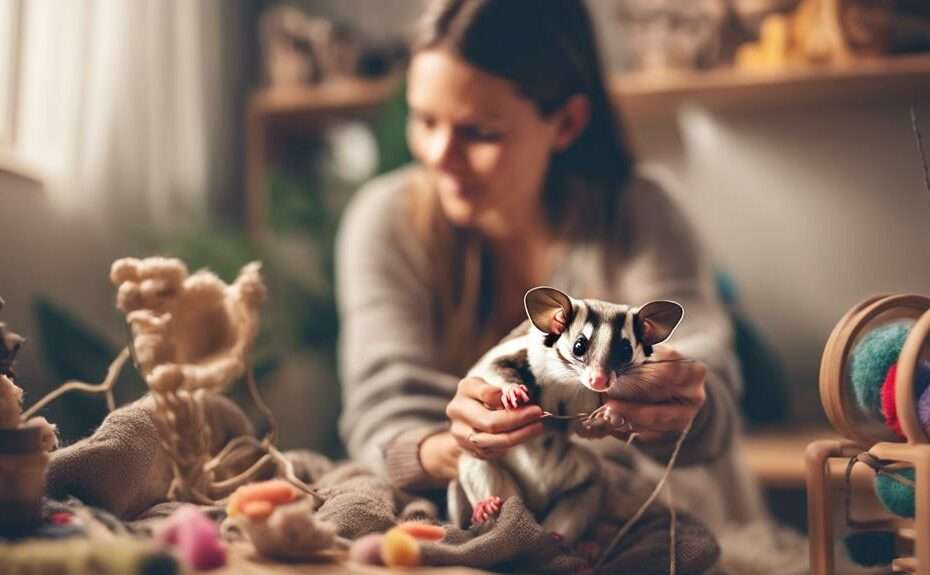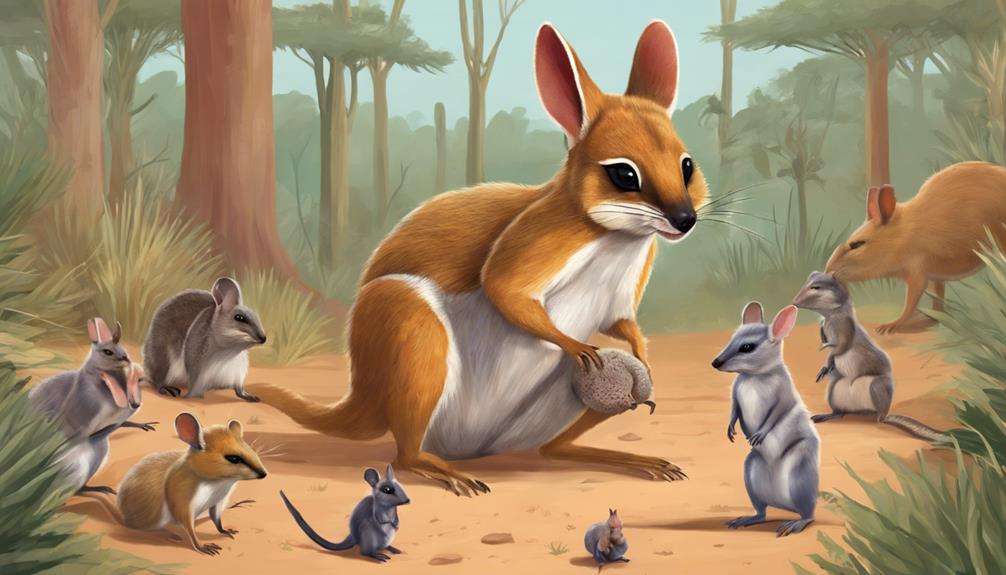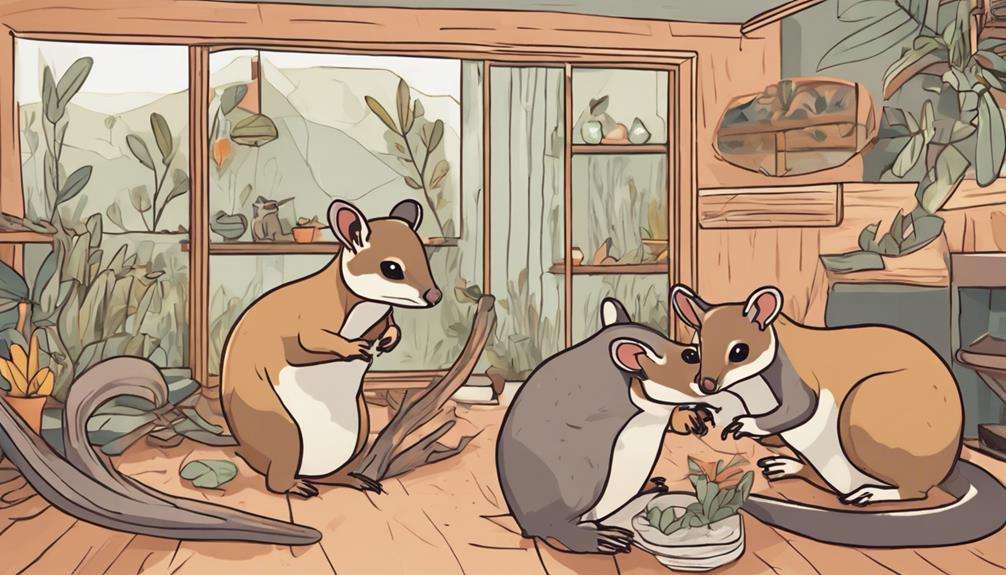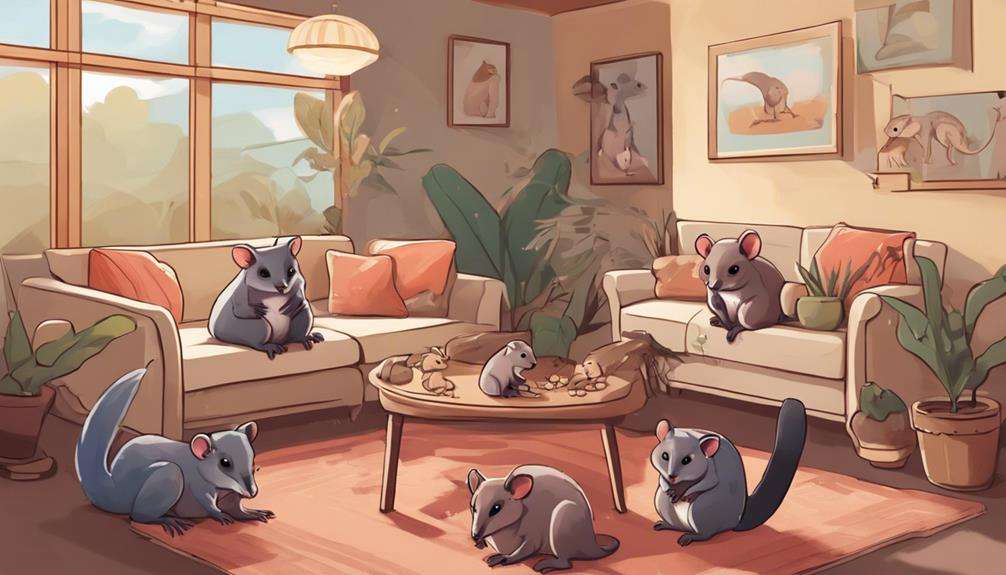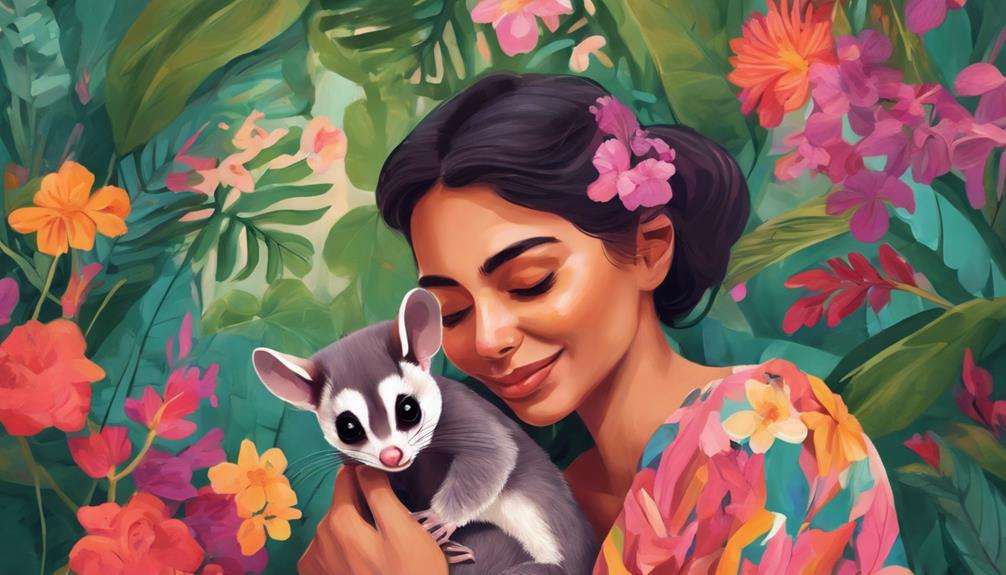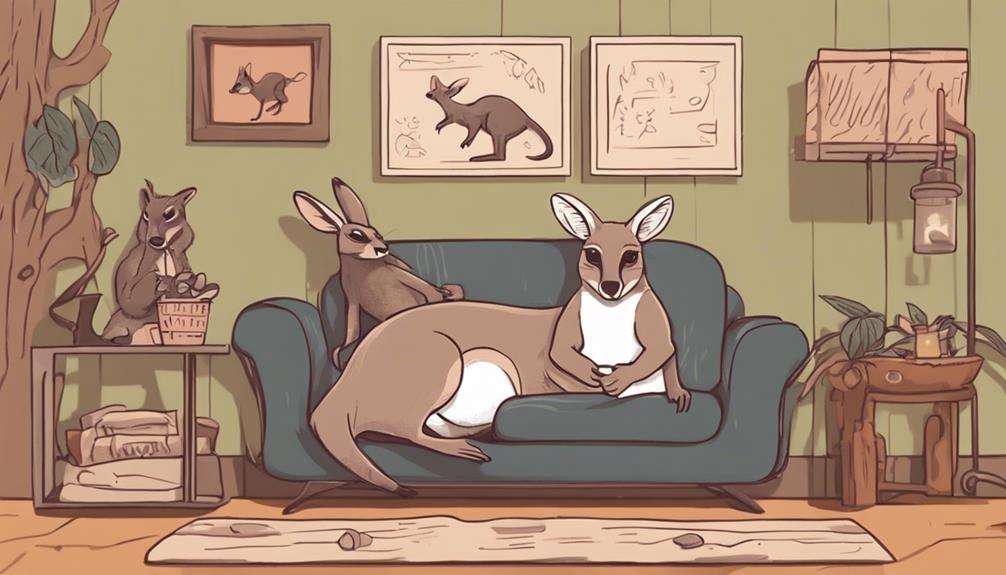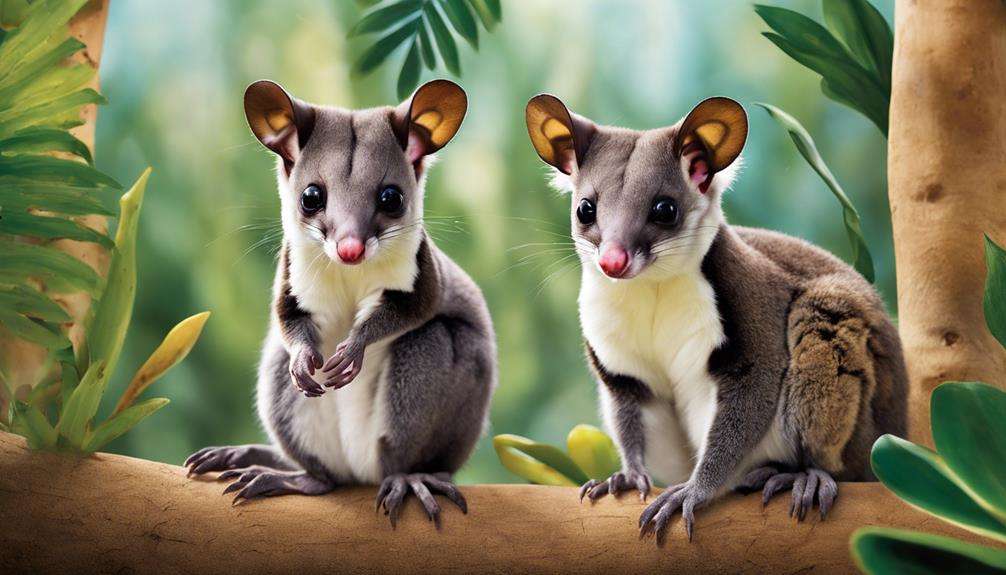If you've ever considered welcoming an uncommon marsupial into your home, you'll want to ensure you're equipped with the necessary knowledge and tools to provide excellent care.
From choosing the right species to emergency preparedness, each aspect plays a crucial role in the well-being of your unique pet.
Stay tuned to uncover valuable insights that will help you navigate the rewarding journey of caring for these extraordinary creatures.
Key Takeaways
- Choose marsupials based on size and temperament for suitable care.
- Tailor diets to species' needs, like fruits for sugar gliders and hay for wallabies.
- Provide ample space, enrichment, and social interaction for mental and physical health.
- Regular veterinary check-ups, gentle handling, and early distress detection are crucial for well-being.
Choosing the Right Marsupial Species
When selecting a marsupial species as a potential exotic pet, it's crucial to carefully consider factors such as size and temperament to ensure compatibility with your living environment. Marsupials like sugar gliders or wallabies have specific dietary needs that must be met to maintain their health. Sugar gliders, for example, require a diet rich in fruits, vegetables, insects, and a protein source like mealworms. On the other hand, wallabies are herbivores that need a diet consisting of hay, fresh grass, and commercial kangaroo pellets.
Moreover, the social nature of marsupials shouldn't be overlooked. These animals thrive on companionship and interaction, whether with their own species or with humans. Providing adequate socialization is essential for their well-being. Additionally, understanding the habitat requirements of marsupials is vital. They may need climbing structures, nest boxes, and ample space for exercise to mimic their natural environment effectively. By considering these factors, you can ensure a suitable living environment for your chosen marsupial species.
Understanding Unique Dietary Needs
To ensure the optimal health and well-being of uncommon marsupials like sugar gliders and wallabies, it's essential to understand their unique dietary requirements. Marsupials have specific dietary needs that must be met to maintain their health. Sugar gliders, for instance, require a diet rich in fruits and insects to replicate their natural feeding behaviors in the wild. On the other hand, wallabies are herbivores and need a diet primarily composed of high-quality grasses, hay, and leafy greens to thrive.
Proteins play a crucial role in the diets of marsupials, providing essential nutrients for growth and energy. Supplementing their diet with vitamin and mineral supplements may be necessary to ensure they receive all the vital nutrients not present in their primary food sources. Consulting with a veterinarian experienced in exotic pet care is vital to develop a tailored diet plan that meets the specific nutritional requirements of these uncommon marsupials. Remember, a well-balanced diet is key to keeping your marsupial healthy and happy.
Providing Suitable Enclosures
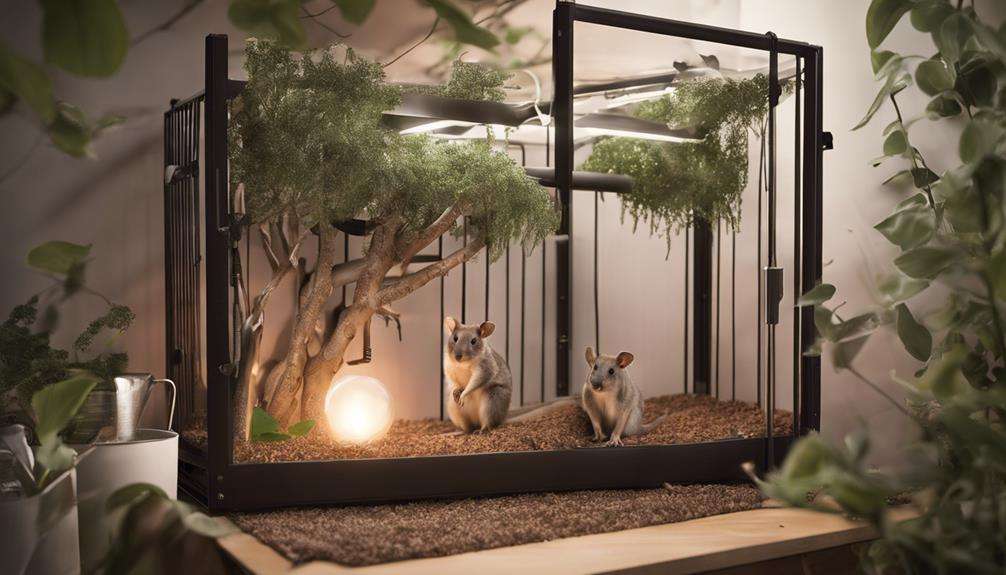
When designing enclosures for uncommon marsupials like sugar gliders and wallabies, it's crucial to consider their need for spacious environments that provide sufficient vertical space for climbing and exercise. To ensure the well-being and safety of these unique animals, here are essential elements to incorporate into their enclosures:
- Spaciousness: Provide ample room for movement and exploration, allowing them to exhibit natural behaviors and prevent feelings of confinement.
- Secure Locks: Install locks that are escape-proof to prevent the marsupials from accidentally getting out and potentially harming themselves.
- Ventilation: Maintain proper airflow within the enclosure to ensure the marsupials have access to fresh air and prevent the buildup of harmful gases.
- Temperature Control: Ensure the enclosure is kept at an appropriate temperature range suitable for the specific marsupial species to keep them comfortable and healthy.
Creating Enrichment Opportunities
To ensure the mental stimulation of uncommon marsupials like sugar gliders, providing puzzle feeders and foraging toys can keep their minds active.
Incorporating climbing structures and hiding spots in their environment offers physical activities that engage their natural instincts.
Social interaction opportunities through interactive playtime and training exercises also play a crucial role in strengthening the bond between owners and their pet marsupials.
Enrichment for Mental Stimulation
Enhance the mental stimulation of uncommon marsupials by providing puzzle feeders, foraging opportunities, and interactive toys in their environment.
- Puzzle Feeders: Offer food puzzles to encourage problem-solving skills and keep their minds active.
- Foraging Opportunities: Scatter food in different areas to promote natural foraging behaviors and mental engagement.
- Interactive Toys: Provide toys that encourage play and exploration, stimulating their cognitive abilities.
- Hiding Spots and Scent Enrichment: Create hiding spots for privacy and security, and introduce scent enrichment activities to engage their senses further.
Physical Activities for Engagement
To ensure optimal physical engagement for uncommon marsupials, establish a diverse environment equipped with climbing structures and tunnels that promote their natural behaviors effectively.
Offer interactive toys like puzzle feeders and foraging opportunities to provide mental stimulation.
Incorporate safe toys such as balls and chew toys to encourage physical activity and prevent boredom in these unique pets.
Rotate and vary enrichment activities regularly to maintain interest and prevent habituation.
Additionally, include sensory experiences with different textures, scents, and sounds to enrich the lives of uncommon marsupials in captivity.
Social Interaction Opportunities
For uncommon marsupials like sugar gliders, fostering social interaction and bonding opportunities is crucial for their well-being and development in captivity. To ensure the exotic pet's optimal care, consider the following enrichment activities and bonding opportunities:
- Playtime: Engage in interactive play sessions to build trust and strengthen the bond.
- Bonding Pouches: Provide cozy pouches for comfort and bonding with their human caretakers.
- Supervised Exploration: Allow safe exploration under supervision to encourage curiosity and mental stimulation.
- Socialization: Facilitate interactions with humans and compatible pets to promote emotional well-being and social development.
Regular Veterinary Check-Ups
Ensure you schedule regular veterinary check-ups for your uncommon marsupial pets to monitor their health closely. These appointments are crucial for early detection of any potential health issues and prompt intervention.
Veterinarians can offer tailored guidance on nutrition, habitat requirements, and specialized care to ensure your marsupial thrives in a domestic environment.
Health Monitoring Guidelines
Regular veterinary check-ups play a crucial role in monitoring the health of uncommon marsupials kept as pets. When it comes to exotic pets' health, preventive care is key to ensuring their well-being. Here are some guidelines to help you understand the importance of regular veterinary visits:
- Early Detection: Regular check-ups help detect any health issues early on.
- Preventive Care: These visits ensure your pet receives the necessary preventive care.
- Unique Dietary Needs: Marsupials have unique dietary requirements that require specialized veterinary attention.
- Specialized Veterinary Attention: Veterinarians can provide guidance on nutrition, habitat maintenance, and overall well-being specific to uncommon marsupials.
Establishing a routine check-up schedule with an experienced exotic animal veterinarian is essential for your pet's long-term health.
Preventive Care Importance
To maintain the optimal health of uncommon marsupials kept as pets, it's imperative to prioritize regular veterinary check-ups for preventive care and early detection of potential health issues. Regular veterinary check-ups play a crucial role in ensuring the well-being and longevity of your marsupial companion. Through these visits, veterinarians can conduct thorough examinations, identify any emerging health concerns, and provide specific preventive measures tailored to the unique needs of uncommon marsupials.
Early detection of health issues allows for prompt intervention and treatment, preventing conditions from escalating. These routine check-ups also enable veterinarians to offer guidance on proper diet, habitat requirements, and overall care practices to support the overall health of your uncommon marsupial pet. By investing in preventive care, you're actively contributing to the well-being of your furry friend.
Handling and Socializing Techniques
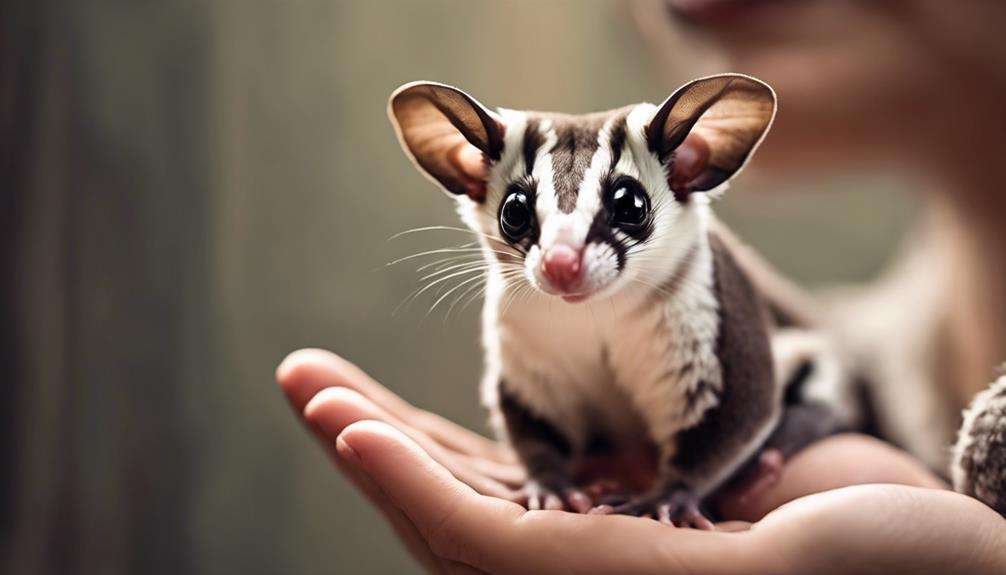
When handling and socializing uncommon marsupials like sugar gliders and wallabies, prioritize gentle interactions to build trust and reduce their stress levels. To effectively bond with these exotic pets, follow these techniques:
- Approach Slowly: Avoid sudden movements and loud noises to prevent startling the marsupials.
- Use Positive Reinforcement: Reward desired behaviors with treats or praise to encourage socialization.
- Respect Their Boundaries: Allow the marsupials to initiate contact to ensure they feel comfortable and in control.
- Engage in Interactive Play: Interactive play sessions can help strengthen the bond and create a positive association with human interaction.
Managing Specialized Grooming Requirements
For effective care of uncommon marsupials like sugar gliders and wallabies, attention to their specialized grooming requirements is crucial. Marsupials, with their unique fur textures and skin sensitivities, require regular grooming to maintain healthy skin and coat. This grooming routine helps prevent issues such as matting, odor, and skin infections. To meet their specialized grooming needs, specific tools like soft brushes, gentle shampoos, and nail clippers designed for small animals are essential. These tools ensure that the grooming process is gentle and effective for these delicate creatures.
Grooming sessions not only cater to the physical needs of marsupials but also provide valuable bonding opportunities. During these sessions, you can strengthen your bond with your pet marsupial while promoting their overall well-being and comfort. Professional groomers experienced in handling exotic pets can offer guidance on the best grooming practices tailored to uncommon marsupials. By investing time and effort into understanding and fulfilling their grooming requirements, you can ensure that your marsupial companion stays healthy and happy.
Recognizing Signs of Distress
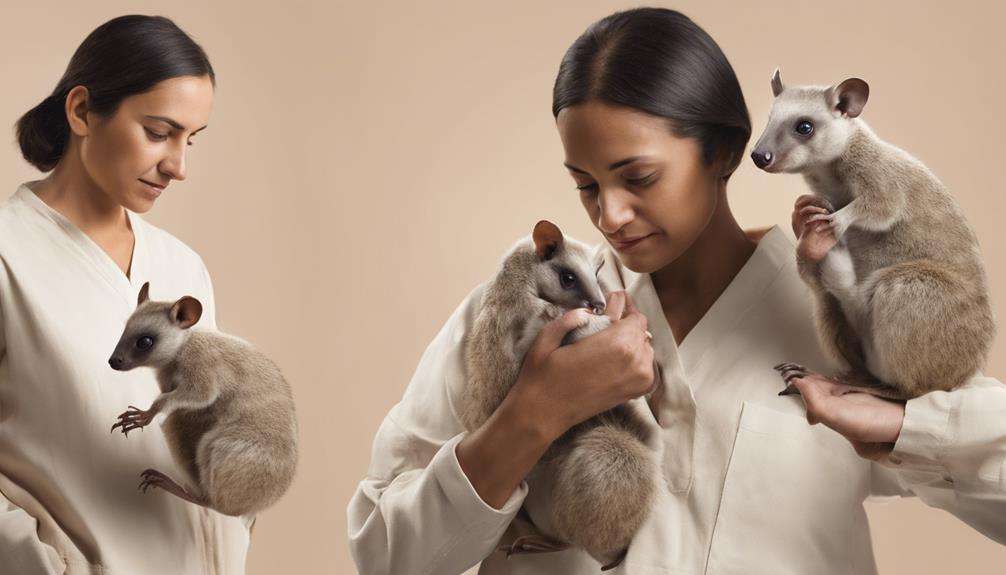
Recognizing signs of distress in uncommon marsupials like sugar gliders and wallabies is crucial for ensuring their well-being and addressing any underlying issues promptly. When caring for these exotic pets, it's important to be attentive to their behavior and physical cues that may indicate they're in distress. Here are some key signs to watch for:
- Excessive Vocalization: Uncommon marsupials may vocalize more than usual when distressed, expressing their discomfort through sounds.
- Changes in Eating Habits: A sudden decrease in appetite or refusal to eat can signal distress in these unique animals.
- Unusual Behavior: Look out for any abnormal behaviors such as excessive grooming, aggression, or attempts to escape their enclosure.
- Decreased Activity Levels: If your marsupial is unusually lethargic or less active than usual, it could be a sign of underlying distress that requires attention.
If you notice any of these signs, seeking veterinary care from professionals experienced with exotic pets is crucial for providing the best care for your uncommon marsupial companions.
Safely Introducing to Other Pets
To safely introduce uncommon marsupials to other pets, gradual and controlled interactions in familiar environments are essential for minimizing stress and potential conflicts. When bringing exotic pets into a home with existing animals, it's crucial to introduce them slowly. Begin by providing separate spaces for the marsupials and other pets to allow them to become accustomed to each other's presence and scents. Monitor their initial interactions closely to ensure safety and positive reactions. Utilize positive reinforcement techniques such as treats and rewards to encourage peaceful encounters and mutual acceptance between the marsupials and other pets.
If any signs of aggression or difficulties arise during the introduction process, seek guidance from exotic animal experts or behavior specialists. Remember, each animal has its own unique personality and temperament, so patience and careful observation are key. By following these steps and offering a supportive environment, you can help foster harmonious relationships between your uncommon marsupials and other pets.
Emergency Preparedness and First Aid
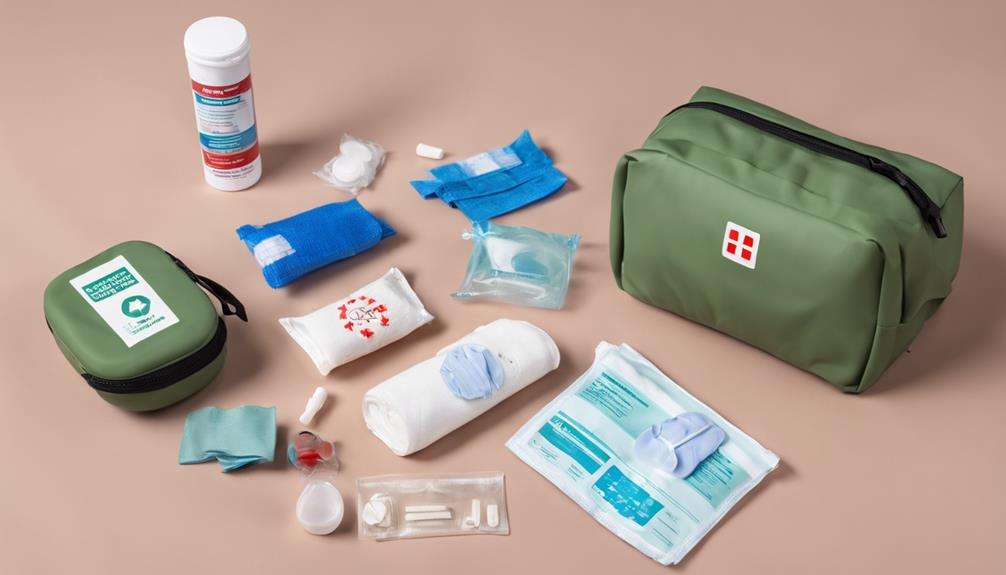
Regularly updating and maintaining your marsupial's first aid kit with fresh supplies and medications ensures readiness for any unforeseen emergencies. When dealing with an exotic pet like a marsupial, being prepared for emergency situations is crucial. Here are some essential items to include in your marsupial's first aid kit:
- Wound Care Supplies: Stock up on sterile gauze pads, antiseptic wipes, and wound-cleaning solutions to treat any injuries your marsupial may sustain.
- Bandaging Materials: Have a variety of bandages, adhesive tape, and self-adherent wraps to secure dressings and provide support for sprains or strains.
- Emergency Medications: Include medications prescribed by your veterinarian specifically for your marsupial, such as pain relievers or antibiotics.
- Emergency Contact Information: Keep a list of contact numbers for an exotic animal veterinarian experienced in treating marsupials and local animal emergency clinics handy for quick access during emergencies.
Frequently Asked Questions
Can You Have Marsupial as a Pet?
You can have a marsupial as a pet with legal restrictions. Ensure a proper enclosure, unique diet, and bonding time. Remember, these animals have specific needs. Meeting them is crucial for their well-being and your enjoyment as a pet owner.
How Do You Take Care of an Exotic Pet?
To care for an exotic pet, ensure proper feeding habits, housing requirements, enrichment activities, and bonding. Research and tailor care to the specific species. Regular veterinary check-ups, social interaction, and mental stimulation are vital.
What Is the Best Marsupial Pet?
When choosing the best marsupial pet, consider unique behaviors, specialized diet, enclosure requirements, and bonding techniques. Research thoroughly to match the pet's needs with your lifestyle for a fulfilling companionship and a thriving environment.
What Is the Most Uncommon Animal to Have a Pet?
When it comes to exotic pets, unique rodents like capybaras can be the most uncommon animals to have as pets. They require specific care and space due to their large size and social nature.
Conclusion
In conclusion, ensure your uncommon marsupial pets thrive by staying vigilant and prepared.
Remember to regularly monitor their health, offer enriching environments, and seek professional guidance.
By practicing proper care, you can guarantee their well-being and happiness.
Stay steadfast in your commitment to these captivating creatures and they'll bring joy for years to come.
